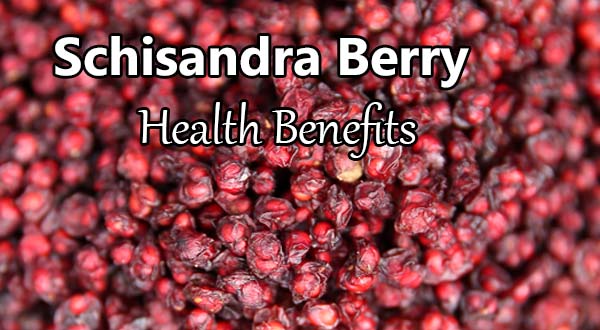Deep in the forests of China – the same places where pandas and tigers live – you can find schisandra growing wild. The vine wraps itself around trees, snaking its way to the top, and produces clusters of red berries. These red schisandra berries are prized for their health benefits including boosting energy, treating adrenal fatigue, and balancing gut health.
What is Schisandra?
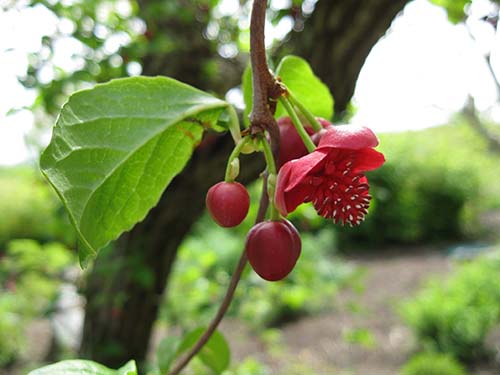
Schisandra is a plant native to Asia. The schisandra berries have been used for thousands of years in Chinese medicine and is still one of the most well-known medicinal plants in the region.
It wasn’t until WWII that schisandra berry became known worldwide though. The Soviet Union began studying schisandra and giving it to pilots. They discovered that the native “Nanai” people who live near the Russia/China border used schisandra when hunting. The berries and seeds were said to reduce exhaustion, hunger and thirst and even improve night vision.
There have since been thousands of studies about the benefits of schisandra. It is considered one of the best adaptogens for boosting energy and reducing stress. Dr. Oz called it the “micracle anti-aging pill” and it’s considered a superfood for all its health benefits. (1)
Types of Schisandra
Schisandra is the Latin name for the plant’s genus. There are many different species of Schisandra. However, the ones which are most often used medicinally are Schisandra chinensis and Schisandra sphenanthera. Other species of Schisandra may also have health benefits but they haven’t been studied as much as those species.
Other Names for Schisandra
- Fructus Schisandrae
- Schisandra chinensis
- Schisandra sphenanthera
- Schizandra
- Five flavor berry
- Wu wei zi (Chinese)
- Magnolia vine
- Chosen-Gomischi (Japanese)
- Omija (Korean)
Health Benefits of Schisandra
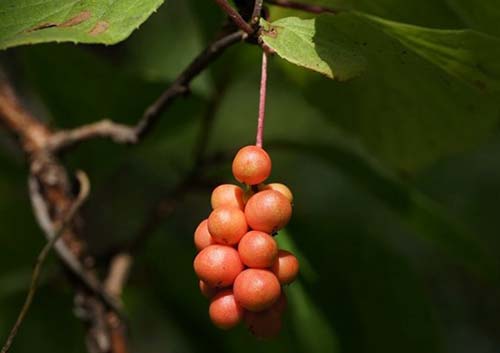
1. Adaptogen
The main benefit of schisandra is that it is an adaptogen. Adaptogens are substances which help regulate the stress response. It does this by acting on the hypothalamic-pituitary-adrenal axis.
Normally the body reacts to stress by going into an alarm phase followed by resistance phase and finally exhaustion. Adaptogens like schisandra extend the resistance phase, allowing the body to fight through stress longer without it taking a toll on the body. Even though schisandra can exert a stimulant-like effect, the body doesn’t build up a tolerance to it like with stimulants. (2, 3)
2. Increased Energy and Focus
As an adaptogen, schisandra helps increase energy levels and focus. Various studies have found that taking schisandra helps increase “mental work capacity” when under stress or tired. Healthy subjects taking schisandra had better mental performance and could work for longer. (4, 5)
3. Fights Effects of Stress
Stress takes its toll on the body in many ways, from triggering inflammation to straining the central nervous and immune systems. As an adaptogen, schisandra not only reduces stress but prevents damage from stress. Studies found that schisandra even reduced amounts of frostbite, skin burn, and heat shock on subjects in physically-stressful conditions.
If you regularly put your body in stressful situations – such as working long hours, not getting enough sleep, or doing intense workouts – then schisandra could prevent damage to the body. (6, 7, 8)
4. Depression
One of the traditional uses for schisandra is treating depression. Modern research supports the antidepressant benefits of the plant. It works by reducing inflammation, regulating neurotransmitters, and modulating brain-derived neurotrophic factor (BDNF) related pathways.(9, 10, 11, 12, 13)
5. Treats Insomnia
While not as much is known about this benefit, studies do show that schisandra extract can treat insomnia. It likely works by acting on the GABA system in the body. Traditionally, it is schisandra wine is used instead of tea or extracts for treating insomnia. (14, 15, 16, 17)
6. Reduces Inflammation
Schisandra contains antioxidants and lignans which fight against inflammatory cytokins. It also regulates other pathways which trigger inflammation in the body. As a result, schisandra has a strong anti-inflammatory effect. Because inflammation is the root cause of many health conditions, research has found that taking schisandra could help treat:
- Psoriasis, eczema and other inflammation skin diseases
- Arthritis
- Lung inflammation
- Liver disease
7. Improves Gut Health
In the past decade there has been a huge amount of research into gut flora – the bacteria that lives in our digestive tract. We now know that these various bacteria “talk” to our brains and regulate multiple pathways in our bodies. Because of this, probiotics have become very popular. But taking schisandra is another way to improve gut health.
Unlike probiotics (which only add “helpful” bacteria to the gut), schisandra seems to kill harmful bacteria while supporting helpful bacteria. This means schisandra, along with the Chinese root atractylodes, has potential to treat:
- Obesity
- Ulcers
- IBS and IBD
- Diarrhea
- Depression and anxiety
- Inflammation
8. Adrenal Health
The adrenal glands, which sit on top of the kidneys, are responsible for producing hormones like cortisol that regulate metabolism, blood pressure, and immunity. Prolonged exposure to stress can cause adrenal fatigue, a condition where your adrenal glands aren’t able to produce adequate hormones. Symptoms include fatigue, brain fog, lethargy and difficulty sleeping.
Various studies have shown that taking schisandra can help treat adrenal fatigue. One study, for example concluded that it “appears to protect the cell structure of the adrenal cortex and offset the negative effects of psychological stress and strenuous exercise related to immune dysfunction.”
Other studies are still needed. However, because schisandra is so good at regulating stress pathways, it is likely to improve adrenal health as well. (27, 28)
How to Use Schisandra
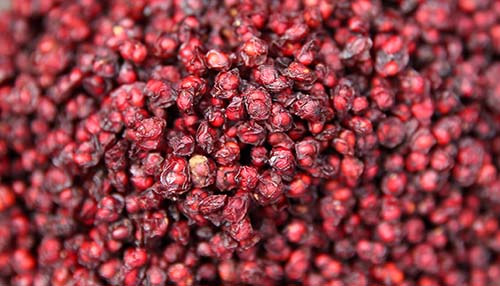
The parts of schisandra used medicinally are the seeds and berries. You can take htem as a tea, powdered extract or tincture.
Schisandra Tea
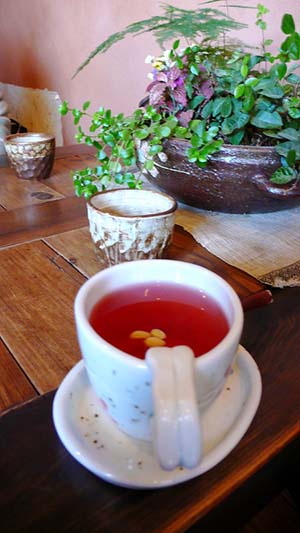
The medicinal compounds in schisandra are water-soluble, so you can drink schisandra as a tea to get health benefits. It is actually a very pleasant-tasting tea, which is a nice change from other medicinal teas. You’ll usually find schisandra mixed with other medicinal herbs though. Only a few brands make 100% schisandra berry tea.
Dosage:
If using whole dried schisandra berries to make your tea:
- Rinse the berries
- Put the berries in a large pitcher and cover them with water. Use a ratio of 4 cups of water to ½ oz (15g) of dried berries
- Let the berries soak overnight
- Put the berries through a strainer, catching the liquid. This is your tea.
If using schindra tea in bags, simply cover with hot water and let steep for about 5 minutes before drinking. If you steep too long, the schisandra tea won’t taste as nice.
Recommended Teas:
Powdered Schisandra Extract
Powdered schisandra is made by drying the fruit. Some brands take it a step further and concentrate the powder. You’ll see these listed as a ratio, such as 4:1. This would mean that 5 parts of schisandra was used to create 1 part of final powder. The higher the number, the stronger the schisandra powder.
Dosage: Typically 1.5 to 6 grams of powdered schisandra is used for medicinal benefits. If using concentrated powder extracts, then you won’t need as much to produce benefits. Typical dosages for extracts are 2g of powder per day.
Recommended Powders:
Schisandra Tinctures
You can also find schisandra as a tincture. Usually it is extracted by soaking it in alcohol but some formulations use vegetable oil extracts. The amount of actual schisandra in the extracts can vary drastically between products, so pay attention to the final amount of schisandra per dose.
Dosage: Usually 600mg to 1g of concentrated schisandra per day
Recommended Tinctures:
Image credits:
“Лимонник – Schisandra chinensis” (CC BY-NC 2.0) by Tatters ✾
“Flowering vine” (CC BY-NC-SA 2.0) by Eileen Delhi
“Omija Cha” (CC BY-NC-ND 2.0) by Ivan Lian
“Omija_punch_02” (CC BY-SA 2.0) by KOREA.NET – Official page of the Republic of Korea
Other resources:
https://www.sciencedirect.com/science/article/abs/pii/S0144861717314649https://time.com/5025278/adaptogens-herbs-stress-anxiety/
https://link.springer.com/article/10.1007/s11101-018-9582-0

